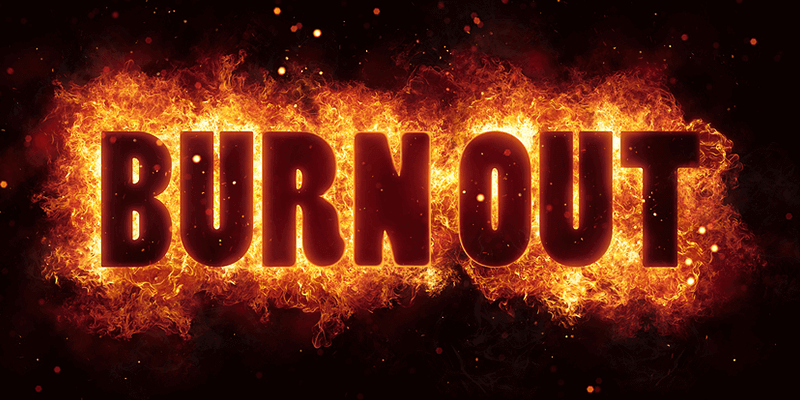
Published on: April 15, 2019
Avoiding Burnout as a Work-From-Anywhere Pro
Many articles have been written about unplugging from your job and setting boundaries in remote work. Yet why do many of us find ourselves basking in the glow of our laptops at night, or responding to emails while spending time with loved ones?
The lure of location independent roles can lead to an inability to disconnect and decompress from the pressures of our professional existence. Focusing and feeling present in our personal lives increasingly becomes an issue, with work (and relationships) often suffering as a result.
You may have experienced or currently be dealing with burnout and its unintended consequences.
Here are some of the warning signs of an imbalanced approach to work, with strategies to head them off before things get too serious:
Emotional unavailability. “I just don’t care anymore.”
We’ve all hit a threshold where frustration can take over, leading us to believe that a particularly challenging project either won’t get completed or be done well enough, or that a conflict with a colleague simply cannot be resolved. Sometimes we react with anger; other times, with apathy. Snapping at, offending, or hurting others may become a routine. If there’s no rebound from bottoming out, this kind of emotional exhaustion wreaks havoc in our personal lives, distancing us from those we love most and draining us of the ability and desire to reroute our course. Our work suffers, and we either deflect or put up emotional walls. Meditation, yoga, and therapy are three excellent ways to refocus our energy, reconnect with our inner strength, and find practical ways to promote a calmer existence.
Physical discomfort. “My back is in knots; it’s really killing me.”
Issues that continue to affect us emotionally can often end up manifesting themselves as actual pain. You may have witnessed this in some form with your parents, if they spent most of their professional lives laboring in 8-to-5 jobs or shift work, with potentially far less control over their careers and schedules. So that recurring headache, tight shoulder, or throbbing leg you’ve been experiencing may be due to the fact that you’re not managing stress well in other aspects of your life. Don’t ignore these warning signals. When work seems to be closing in on you and your level of discomfort is rising, take a step back to evaluate what can be done—by delegating tasks, saying no to certain responsibilities, or talking things out with a manager or teammate.
Susceptibility to illness. “How am I coming down with another cold?”
The human immune system is highly complex. It constantly responds and adapts to its environment, and is heavily influenced by the ways you take care of (or neglect) yourself: mentally, physically, and emotionally. Have you ever lost count of the last time you felt truly healthy? If it seems that you’ve been sick on and off for weeks, or that the moment someone sneezes, you know an influx of vitamin C would be in vain, it’s time to reevaluate how you can set some parameters to improve your health. Ensuring that you eat better, have an opportunity to exercise regularly, and are able to get enough rest will help protect against viruses. And although remote workers often don’t take sick days, wouldn’t you rather spend more of your time on the job feeling closer to 100%?
Poor focus. “I’m way behind, but just can’t get seem to get things done.”
Ever find yourself trying to fix a technical error you’ve made or wrangle your way out of writer’s block, to no avail? You might be forestalled by a basic mistake or obviously needed shift, yet you’re unable to see it. Struggling to think clearly is the first sign that burnout may be getting the better of you. Perhaps you haven’t been sleeping well, or you’ve become distracted by myriad other issues (interpersonal and otherwise) that have recently cropped up in your life. When concentration becomes too difficult, many of us feel the instinct to dig in and grind away harder, as if focus will come to us if we will it. Instead, resist the urge to plow forward and take time to rest. (Force yourself, if you must, by scheduling it into your calendar!)
Mental downward spiral. “There’s no way out of this mess.”
In our hustle-hard culture, it may seem as if there’s no room for prioritizing personal wellness. You might feel compelled to soldier on despite experiencing a few (or most) of the above issues. Convincing yourself that others won’t understand, you keep your troubles to yourself. The feeling of hopelessness? It represents the most dangerous aspect of burnout. Yet it’s so insidious that you may have trouble identifying it as it creeps into your life.
When we find ourselves experiencing all of the other complications of overworking—that is, feeling burdened, behaving poorly toward others, working inefficiently, suffering from pain—it’s not surprising that it’s much harder to pull out of a funk. This can lead to extended periods of depression that require professional help and treatment. If you address the aforementioned signs proactively, however, you can avoid this path.
Photo Credit: bigstockphoto.com
By Megan Dawkins | Categories: Work Remotely



